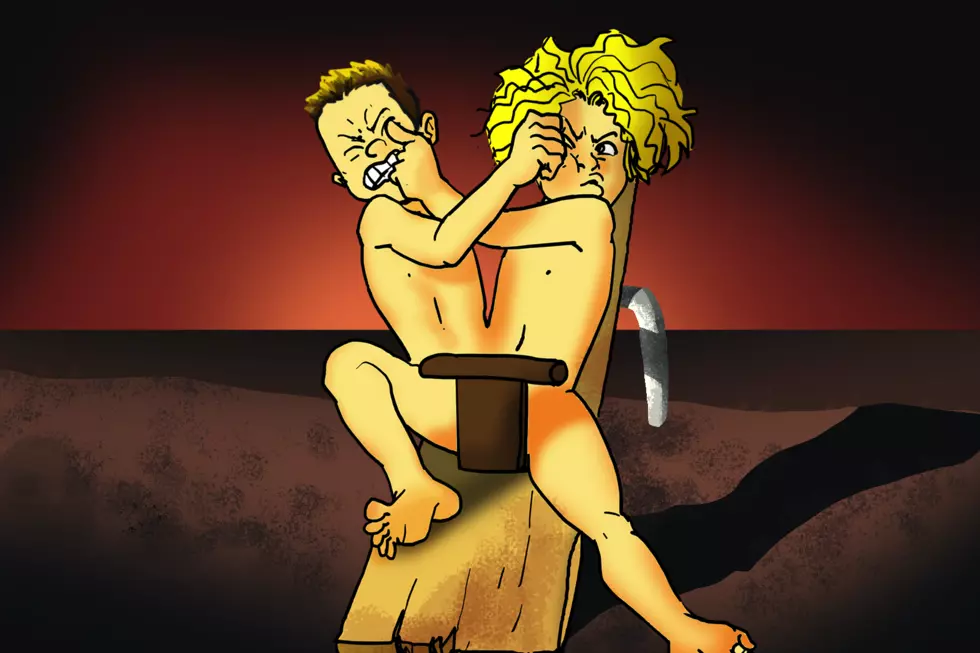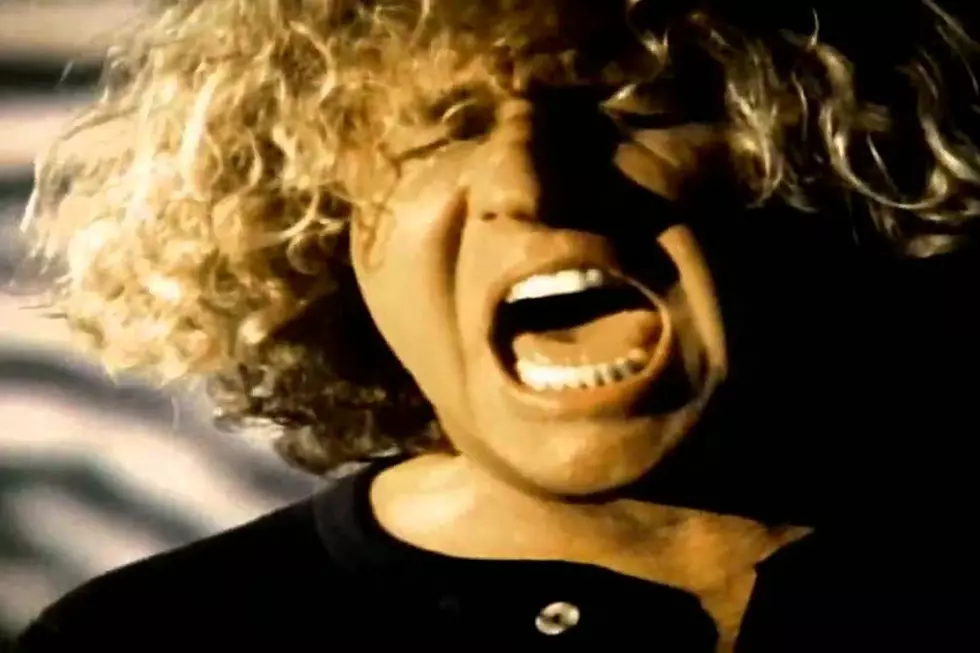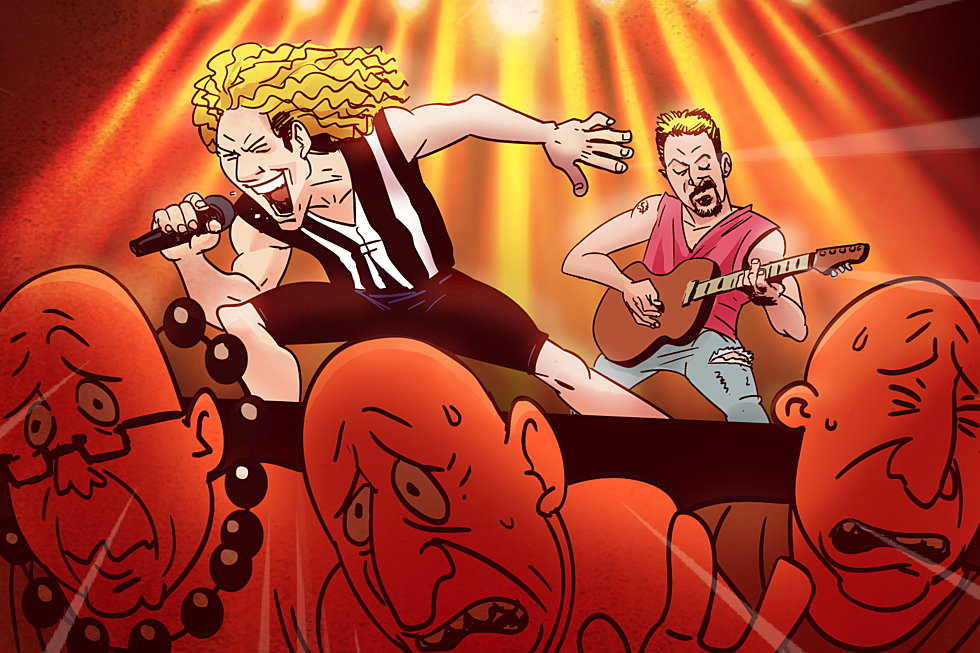
‘Balance’ at 25: Five Questions About the Last ‘Van Hagar’ Album
The fourth and final Sammy Hagar-era Van Halen album, 1995's Balance, had a rather difficult birth.
The once happy and fully unified band was now arguing in the studio over lyrical direction and more personal issues. By his own admission, it was the first album Eddie Van Halen recorded sober, a positive but also daunting step. It also found the band, perhaps inspired or otherwise influenced by the recent grunge revolution, taking a more serious tone both musically and thematically.
The internal and external interest in a reunion with former singer David Lee Roth also loomed over the project. In his 2011 autobiography Red: My Uncensored Life in Rock, Hagar said he knew "it was over" for this version of Van Halen, even while they were still working on Balance: "I knew they were trying to get rid of me."
On the flip side, in a 1998 Guitar World interview, Eddie claimed his newfound clarity merely exposed issues that were already lurking below the surface. "What I did was I took charge of myself, my own life," he said. "And that freaked people out who used to control me."
Given that atmosphere, it seems like a miracle Balance got finished at all. But was it worth all that stress? Our roundtable tackles five big questions.
What's your overall take on Balance?
Matthew Wilkening: On first listen way back in 1995, it was obvious something was wrong. In retrospect, it's an oddly and ironically named album. It seems pretty clear that "balance" was something the group was striving for, rather than actually experiencing. Both Hagar and the Van Halen brothers have spoken about the arguments they had regarding the lyrics, or lack of them, on "Amsterdam," "Don't Tell Me (What Love Can Do)" and "Baluchitherium." After the occasionally repetitive back-to-basics approach of 1991's For Unlawful Carnal Knowledge, it was admirable to see them trying to stretch out both in terms of music and subject matter. There are some high points, but also far more filler than on any prior Van Halen record. For the first time in their career, it didn't sound like they were on solid footing as a group or anywhere close to being on the same page personally. This was all confirmed with Hagar's acrimonious departure the following year, which kicked off one of rock's longest and still-running cold wars.
Michael Christopher: I think it’s unfairly maligned. So much had changed in the musical landscape since For Unlawful Carnal Knowledge came out. The band needed to change things up a bit while retaining their core sound to stay relevant – and they did just that. “Don’t Tell Me (What Love Can Do)” had enough menace to align with the dour last days of grunge and was a perfect choice for the first single. Its followup, “Can’t Stop Lovin’ You,” has that ear-worm catchiness that could compete with the radio-friendliness of Hootie & the Blowfish and Sheryl Crow dominating the Top 40. We know now how band tensions had gotten between Hagar and the Van Halen brothers, which would certainly explain the amount of filler on Balance, but that strain led to some of the strongest lyrics from Hagar since he had joined. All that said, it is a wildly inconsistent album, and when it’s bad, it really sinks to the depths. From the jarring sequencing of songs to the number of seemingly unfinished ideas, it’s an absolute mess in parts.
Jeff Hausman (Van Halen News Desk): During the entire Sammy Hagar era, Van Halen were my favorite band. The only band I ever liked more was the original Van Halen, but I accepted the change and enjoyed it all. But when Balance came out, I was a bit underwhelmed for the first time. You could almost tell something just wasn't the same with the members of the band. We found out later that was indeed the case. The whole Balance album and tour cycle felt less fun and less like classic Van Halen than ever before. I still enjoyed it, but something was missing. I know that the fan base overall thinks 5150 and F.U.C.K. were the strongest albums from that era, but the overall consensus was more mixed for OU812 and Balance. In my view, OU812 was right up there with 5150 and F.U.C.K., but Balance felt a bit like leftovers to me.
Mitch Lafon (Rock Talk With Mitch Lafon): I absolutely love this album. I picked up the Japanese import to get the brilliant bonus track "Crossing Over." Moreover, the video version of "Don’t Tell Me (What Love Can Do)" is in the Top 3 best "Van Hagar" rockers. The album also includes their best power ballads and best mid-tempo songs, "Not Enough" and "Can’t Stop Lovin’ You." Hopefully, when Hagar tours this summer, he’ll start playing all three. The only thing I hated was the naked kid on the cover (the Japanese cover had one, not two). Note to all bands: Just keep kids off your covers, especially if they're nude. There’s no need for that under any circumstance.
What's the best song on Balance? Overall, how many keepers are on there?
Wilkening: "The Seventh Seal" is the most exciting, and the one that most sounds like a unified group successfully conquering a new challenge. "Take Me Back (Deja Vu)" is a close second. "Don't Tell Me" builds to an epic back half but takes a bit long to do so. And I'm apparently one of the few people who loves "Baluchitherium" and doesn't get why anybody would dismiss it for being an instrumental. This is Eddie Van Halen; he's had instrumental showcases on all but two Van Halen records. Those are the only four I play regularly, with "Feelin'" just missing the cut.
Christopher: “Aftershock.” It’s got such an anxious feel to it, with the music and vocal harmonies managing to complement the lyrics about desperately trying to salvage a relationship without making any concessions. Eddie’s brief guitar interlude exactly halfway through totally changes the feel of the track, bringing it to a level of cheery hopefulness before his solo takes it back into the trenches. It’s amazing. There are just seven keepers overall, which isn’t that terrible when you consider three of the 12 excised songs are completely uninspired instrumentals. The last time Van Halen did that many of them on one album was on Diver Down, but at least then they were interesting on their own or served the track they preceded.
Hausman: "Amsterdam" is my favorite track. Fans give it some flak because of Hagar's lyrics, and I can see why, but I'm not letting that stop me from enjoying this absolute monster of a track. The music throughout that song, including the guitar solo, is as good as it gets. Other highlights for me are "The Seventh Seal," “Baluchitherium” and "Aftershock," even if the vocal parts on the latter don't fully jell. For the guitar solo alone, "Feelin'." "Crossing Over," the bonus track for the Japan release, is wicked and might be the trippiest song Van Halen ever released.
Lafon: They are all keepers except for "Baluchitherium" (it really needs lyrics) and nonsense tracks "Strung Out" and "Doin’ Time." Overall, it’s the perfect power-pop arena-rock album with great summertime songs. Great fun, great videos, great vibe. Van Halen with Sammy Hagar was fun. Man, do I miss those days. "Can’t Stop Lovin’ You" has never not put a smile on my face.
What's the first song you'd cut from Balance? Are there any others you'd replace?
Wilkening: "Can't Stop Lovin' You" was the first time I lost faith in Van Halen and could finally see the argument my "Roth or bust" friends had been making for a decade. The song sounds like it was commissioned by Hallmark. Lots of people love it, I know. Supposedly, the band finished a few other instrumental tracks while recording Balance, with one of them evolving into the Roth-fronted "Can't Get This Stuff No More." It would be interesting to hear those to see if a couple of them could have possibly been more essential than "Big Fat Money" or "Aftershock."
Christopher: Even the band knew the instrumental “Baluchitherium” had so little value that it wasn’t even worth trying to fit on the vinyl edition. But for an actual song with lyrical content, it’s gotta be “Big Fat Money.” Whatever sort of shuffle rhythm they were going for fails miserably, and getting bogged down by Hagar's dreadful lyrics doesn’t help matters. “Space station, starvation, premature ejaculation” and “Smoke this, eat that, my old lady's gettin' fat” are lines that should never appear in a Van Halen song. Also, why not swap out one of the instrumentals for the “Can’t Stop Lovin’ You” B-side, “Crossing Over?” That’s a fascinating piece of experimentation that could have closed the album the same way “Inside” did on 5150.
Hausman: The shorter instrumentals, "Strung Out" and "Doin' Time," don't seem vital to the album, but there are two songs that are among my least favorite in their entire catalog: "Can't Stop Loving You" and "Not Enough." The reason I always loved Van Halen was that they would never write songs like that ... or so I thought. I like their other love songs during this era, but these two felt pretty generic -- like they could have been written by people outside the band. And some of Hagar's lyrics made me cringe, especially the sappy stuff on “Not Enough.” Let other bands do that stuff; this is not what I want from Van Halen.
Lafon: Cut all the instrumentals and weird Eddie experimental tracks like "Strung Out." They simply ruin great albums.
If you had to pick one song from this album for David Lee Roth to sing -- assuming he'd rewrite lyrics, the arrangement, etc. -- what would it be?
Wilkening: "Not Enough," if left unchanged, would be a car crash of epic proportions. The band's post-Balance work with Gary Cherone and Roth made it even more obvious just how much the singer shapes or influences the sound of each Van Halen record. So you can start with the riffs and imagine each song going off into completely different directions. It's easiest to picture Roth doing something interesting with the raw material from "The Seventh Seal," "Take Me Back" and, in a way that I can't explain, "Feelin'."
Christopher: “Amsterdam,” which sounds like the bastard child of “Panama,” is the obvious choice, but if he were able to put his lyrical spin on things, I’d love to see what Roth would do with “Don’t Tell Me (What Love Can Do).” It’s musically adventurous in some of the same ways “Me Wise Magic” was and sits in the shadows atmospherically like a lot of Fair Warning, so he could definitely make something interesting out of it -- maybe with some “Mean Street” vibes in his version.
Hausman: For some reason, I never really fantasized about Roth being involved in any of these songs. I'll take the album as is. But around the same time Balance came out there was actually an unofficial Van Halen release that I liked a lot more: their original 1977 25-song demo. That was absolutely thrilling to hear, and it blew my mind that there were killer songs from 1977 that they never released. I felt a lot of those unreleased songs were better than a lot of Balance, so I started to question why they would release some songs and not others. Then again, every Van Halen album had some songs that originated years, or decades, before. That includes Balance, since the main riff from "The Seventh Seal" was from the '70s. That demo contained songs that are still waiting for a proper release. We finally got some of that as half of A Different Kind of Truth. When Hagar started the narrative that it was a cop-out for Van Halen to release old songs with Roth, I thought that was hypocritical because he had no problem releasing old songs on each of the four "Van Hagar" albums. So, I'll turn your question around and say that I bet Hagar would have absolutely loved to be able to work on those leftover demos with the band. I've always found it funny that before A Different Kind of Truth came out, Hagar boasted he'd be the first in line to buy it, but after it came out, he claimed he'd never found the time to listen to the full album. He knew it was great, but couldn't -- or wouldn't -- give them the credit for it.
Lafon: I would love to hear him do "Can’t Stop Lovin’ You," but realistically I think "Don’t Tell Me" would lend itself better to a Roth treatment. It’s Vegas-ready!
On a scale of 1-10, how interested would you be in a new Van Halen album with Sammy Hagar on vocals?
Wilkening: Anything Van Halen gets a 10 at least on initial interest from me. But if you're looking for an actual sense of scale, put me at a 10 for a Roth-fronted album and an eight for one with Hagar. If you assume that Eddie Van Halen's musical interests have continued to lead away from straight-up riff-rock over the past decades, that would logically be more compatible with Hagar's voice and talents. But A Different Kind of Truth proved once and for all that the Roth-Van Halen chemistry is one of a kind.
Christopher: Maybe a three? The trio of songs on The Best of Both Worlds showed there’s not much left in that well, and those good-time, sex-infused lyrics would be embarrassing now. The alternative -- an LP full of socially conscious, deeper-end-of-the-spectrum material in terms of subject matter from Hagar -- wouldn’t work for an entire Van Halen record. He’s got too much joy in his heart to do that.
Hausman: I'd say a 10 because I'd be super-excited for anything from Eddie. If he’s excited about something and wants to put out, I want to hear it, whether it's with Hagar, Roth, someone else or even alone. New or from the vaults -- anything!
Lafon: Twelve, because 10 ain’t high enough! Hagar is the only one who can still deliver the goods like it was still 1985.
Van Halen Albums Ranked
More From 92.9 The Lake










